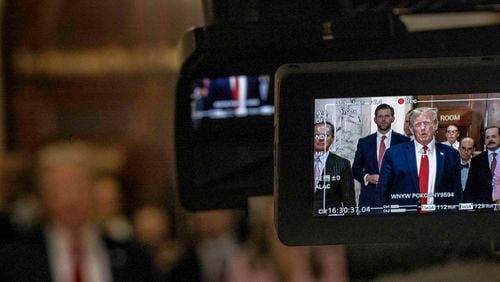The early December hearing was more than six hours long, focused on the kind of procedural minutiae that would typically be ignored by the media and the public.
But the seating area in Fulton Superior Court Judge Scott McAfee’s courtroom was packed, including with some reporters who had flown down from Washington and New York. On McAfee’s YouTube page, thousands of others followed along in real time.
“Who today?” one online commenter asked. A second greeted other “legal eagles” who were tracking the case through a left-leaning news site, while a third lamented that she didn’t get more advanced warning before getting alerted about the hearing.
Consider it a taste of what’s to come in Fulton County as the blockbuster case against former President Donald Trump and more than a dozen others advances.
With the 11th U.S. Circuit Court of Appeals recently rejecting an attempt from co-defendant Mark Meadows, the former White House chief of staff, to move his case to federal court, it’s looking increasingly likely the trial will play out in McAfee’s courtroom. The U.S. Supreme Court will have the final say, but if the case stays where it is the proceedings will be streamed live for the world to watch in real time.
Fulton is the only jurisdiction among the four where Trump stands indicted on criminal charges that allows recordings in the courtroom. That access has driven increased interest in the Georgia case.
The historic indictment has already made District Attorney Fani Willis a national figure. But a televised trial is also likely to bring levels of fame not seen since the O.J. Simpson trial to Willis’s deputies and the several dozen defense attorneys.
The prospect of a televised trial excites many government transparency advocates.
Steven Brill, the lawyer and journalist who founded Court TV in 1991, said allowing the public to watch the methodical presentation of well-vetted evidence could function as an antidote to misinformation about the 2020 election and justice system on social media.
“I think that’s a way to restore trust, frankly,” Brill said on a recent episode of the Atlanta Journal-Constitution podcast “Breakdown.”
Others worry that cameras would add to the carnival-like atmosphere and potentially pave the way for witness and juror intimidation.
Attorney Nick Akerman alluded to his time prosecuting mobsters as an assistant U.S. attorney in the Southern District of New York.
“People are afraid to testify. They will wind up shading their testimony in relation to the fact that they know this is going out into the world,” said Akerman, a former Watergate prosecutor. “All of these people are going to be put in absolute danger. And it’s impossible for the DA to protect these people.”
Presumption of openness
Under Georgia law, state courtrooms are presumed to be open to the public and the press.
Open courtrooms, state statute says, are “an indispensable element of an effective and respected judicial system. It is the policy of Georgia’s courts to promote access to and understanding of court proceedings not only by the participants in them but also by the general public and by news media who will report on the proceedings to the public.”
That typically includes cameras, though judges can place restrictions to ensure “appropriate security and decorum.”
The transparency comes in stark contrast to federal court in Atlanta, where judges strictly bar cameras, smartphones or any recording devices during hearings. Reporters seeking to cover proceedings are required to jot their notes down the old fashioned way: with a pen.
(The Atlanta Journal-Constitution over the years has advocated for cameras in the courtroom, on the belief that the public has better understanding of and trust in decisions when they can observe the workings of the court.)
Polling shows there is strong public support for televising Trump’s trials. A Quinnipiac University survey this summer found that 71% of Americans believed TV cameras should be allowed in the courtroom for Trump’s federal elections case in Washington. And Trump’s lawyers have called for televised proceedings in that trial, saying in a recent court filing that every person should have the opportunity to watch as Trump “exonerates himself of these baseless and politically motivated charges.”
McAfee has suggested he’s interested in keeping proceedings open — but with limits. He live-streams most of his cases on his YouTube page and has authorized a single pool camera and still photographer to record proceedings inside the courtroom for news organizations willing to share resources.
In the back of the minds of some observers is the Simpson trial, which became tabloid fodder and a cultural phenomenon. Some 150 million Americans tuned in to watch the verdict when it was announced in October 1995.
Prosecutors and defense lawyers became overnight celebrities and were seen as pandering to the cameras as the trial advanced. Los Angeles Superior Court Judge Lance Ito was critiqued for losing control of the case and lampooned on late night television, perhaps most famously on “The Tonight Show with Jay Leno,” which cast a quintet of robed doppelgängers in a skit known as “Dancing Itos.”
“I have no aspiration to become the next Judge Ito,” McAfee told The New Yorker in September.
“The idea with my job, in general, is to keep your head down. Stay even-keeled and manage expectations,” McAfee told the magazine. “…It’ll be mission accomplished if I personally bore everyone to death during my trials.”
Cautionary tale
Akerman, the former Watergate prosecutor, also sees the Simpson trial as a cautionary tale. Trump, a onetime reality TV star, has mastered the art of politics as entertainment, and Akerman fears the Republican could rile up political supporters in the thick of campaign season with gestures as small as a wink, a nod or a well-timed outburst during the trial.
“He is an expert at playing to cameras,” Akerman said, noting Trump’s infamous scowl in his Fulton mug shot.
To former Gwinnett County DA Danny Porter, a televised trial is a mixed bag.
“It sort of gives Donald Trump a hand grenade and a pin. He certainly could set something off,” said Porter, a Republican. “But on the other hand... he may not like what comes out as it develops and maybe the American people need to see that.”
The negative impact of increased public attention has already been felt by some. Willis has frequently discussed the racist comments, vitriol and violent threats she’s received since launching the Trump investigation in February 2021. And the grand jurors who handed up the indictment against Trump had their names and addresses doxed online.
Brill, who is now co-CEO of NewsGuard, a site that rates the trustworthiness of news sources to counter misinformation, said there are things that can be done to keep a trial under control, including directing the pool camera to be trained only on the attorneys, not on jurors — and potentially not the witnesses as they’re testifying.
“What you would create is a calm, dispassionate presentation of the facts, whichever way the facts go, without the histrionics, without the drama, without the spin,” Brill said.
In September, McAfee, keeping with the practice of state court judges in high-profile cases, banned news organizations and others from photographing, taping or otherwise identifying jurors and directed prosecutors and attorneys to identify jurors only by their juror numbers in court.
McAfee could also issue a gag order on defendants, not unlike what U.S. District Court Judge Tanya Chutkan has imposed on Trump in the federal Jan. 6 case barring him from targeting prosecutors, witnesses and court staff in his public statements.
Akerman worries no amount of precautions will be enough.
“No matter how hard you try, you’re still going to have some of that Simpson trial problem infecting this case,” he said. ‘It’s just inevitable.”
About the Author








